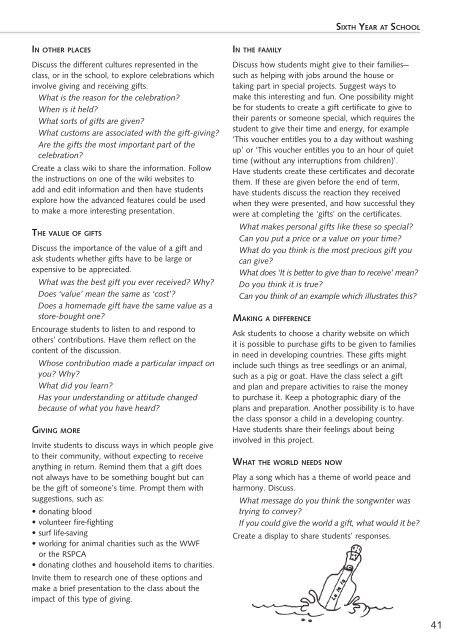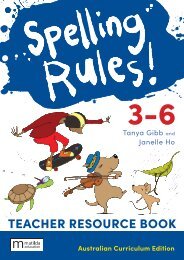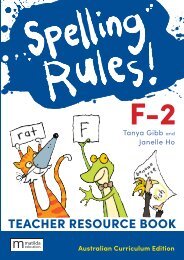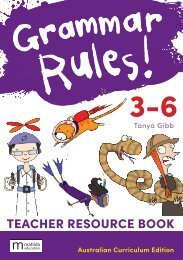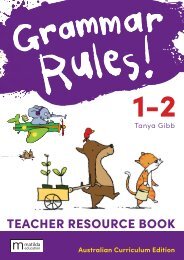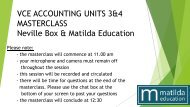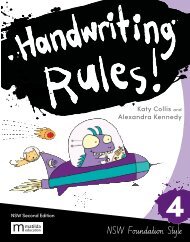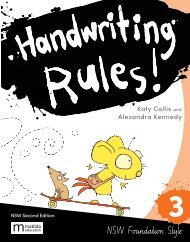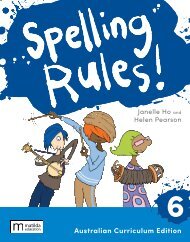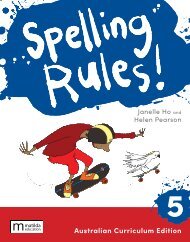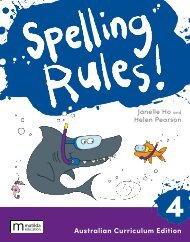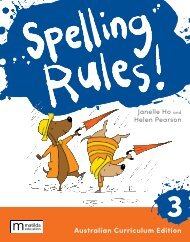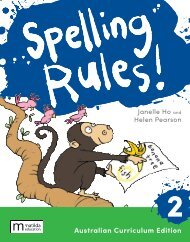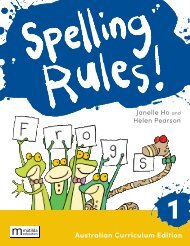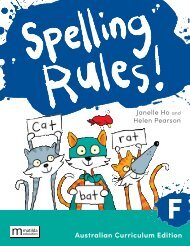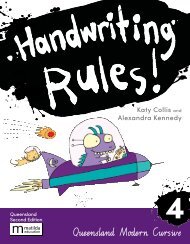All You Need to Teach - Info Literacy 10+
You also want an ePaper? Increase the reach of your titles
YUMPU automatically turns print PDFs into web optimized ePapers that Google loves.
Sixth Year at School<br />
In other places<br />
Discuss the different cultures represented in the<br />
class, or in the school, <strong>to</strong> explore celebrations which<br />
involve giving and receiving gifts.<br />
What is the reason for the celebration?<br />
When is it held?<br />
What sorts of gifts are given?<br />
What cus<strong>to</strong>ms are associated with the gift-giving?<br />
Are the gifts the most important part of the<br />
celebration?<br />
Create a class wiki <strong>to</strong> share the information. Follow<br />
the instructions on one of the wiki websites <strong>to</strong><br />
add and edit information and then have students<br />
explore how the advanced features could be used<br />
<strong>to</strong> make a more interesting presentation.<br />
The value of gifts<br />
Discuss the importance of the value of a gift and<br />
ask students whether gifts have <strong>to</strong> be large or<br />
expensive <strong>to</strong> be appreciated.<br />
What was the best gift you ever received? Why?<br />
Does ‘value’ mean the same as ‘cost’?<br />
Does a homemade gift have the same value as a<br />
s<strong>to</strong>re-bought one?<br />
Encourage students <strong>to</strong> listen <strong>to</strong> and respond <strong>to</strong><br />
others’ contributions. Have them reflect on the<br />
content of the discussion.<br />
Whose contribution made a particular impact on<br />
you? Why?<br />
What did you learn?<br />
Has your understanding or attitude changed<br />
because of what you have heard?<br />
Giving more<br />
Invite students <strong>to</strong> discuss ways in which people give<br />
<strong>to</strong> their community, without expecting <strong>to</strong> receive<br />
anything in return. Remind them that a gift does<br />
not always have <strong>to</strong> be something bought but can<br />
be the gift of someone’s time. Prompt them with<br />
suggestions, such as:<br />
• donating blood<br />
• volunteer fire-fighting<br />
• surf life-saving<br />
• working for animal charities such as the WWF<br />
or the RSPCA<br />
• donating clothes and household items <strong>to</strong> charities.<br />
Invite them <strong>to</strong> research one of these options and<br />
make a brief presentation <strong>to</strong> the class about the<br />
impact of this type of giving.<br />
In the family<br />
Discuss how students might give <strong>to</strong> their families—<br />
such as helping with jobs around the house or<br />
taking part in special projects. Suggest ways <strong>to</strong><br />
make this interesting and fun. One possibility might<br />
be for students <strong>to</strong> create a gift certificate <strong>to</strong> give <strong>to</strong><br />
their parents or someone special, which requires the<br />
student <strong>to</strong> give their time and energy, for example<br />
‘This voucher entitles you <strong>to</strong> a day without washing<br />
up’ or ‘This voucher entitles you <strong>to</strong> an hour of quiet<br />
time (without any interruptions from children)’.<br />
Have students create these certificates and decorate<br />
them. If these are given before the end of term,<br />
have students discuss the reaction they received<br />
when they were presented, and how successful they<br />
were at completing the ‘gifts’ on the certificates.<br />
What makes personal gifts like these so special?<br />
Can you put a price or a value on your time?<br />
What do you think is the most precious gift you<br />
can give?<br />
What does ‘It is better <strong>to</strong> give than <strong>to</strong> receive’ mean?<br />
Do you think it is true?<br />
Can you think of an example which illustrates this?<br />
Making a difference<br />
Ask students <strong>to</strong> choose a charity website on which<br />
it is possible <strong>to</strong> purchase gifts <strong>to</strong> be given <strong>to</strong> families<br />
in need in developing countries. These gifts might<br />
include such things as tree seedlings or an animal,<br />
such as a pig or goat. Have the class select a gift<br />
and plan and prepare activities <strong>to</strong> raise the money<br />
<strong>to</strong> purchase it. Keep a pho<strong>to</strong>graphic diary of the<br />
plans and preparation. Another possibility is <strong>to</strong> have<br />
the class sponsor a child in a developing country.<br />
Have students share their feelings about being<br />
involved in this project.<br />
What the world needs now<br />
Play a song which has a theme of world peace and<br />
harmony. Discuss.<br />
What message do you think the songwriter was<br />
trying <strong>to</strong> convey?<br />
If you could give the world a gift, what would it be?<br />
Create a display <strong>to</strong> share students’ responses.<br />
41


